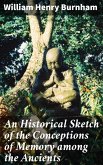In "An Historical Sketch of the Conceptions of Memory among the Ancients," William Henry Burnham meticulously explores the evolving theories of memory from antiquity to the Enlightenment. The book adopts a historical-critical approach, deftly weaving together interpretations from various cultures, including Greek, Roman, and Eastern thought. Burnham's eloquent prose invites the reader to traverse the philosophical landscapes contemplated by ancient scholars, revealing how memory was intertwined with identity, culture, and knowledge. His examination aligns with the burgeoning interest in cognitive studies and provides insight into how historical narratives shape our understanding of human memory. William Henry Burnham, an esteemed scholar in classical studies, dedicated his career to exploring the intersections of philosophy, psychology, and rhetoric. His deep engagement with ancient texts and his academic background provide him with a unique lens through which he examines the foundational concepts of memory. Burnham's passion for understanding human cognition and its historical representation informs his analysis, allowing readers to appreciate the significance of ancient perspectives on memory in contemporary discourse. This book is indispensable for scholars and students alike, offering a rich synthesis of historical context and philosophical insight. Burnham's work not only enriches our understanding of memory as a cognitive function but also serves as a crucial reminder of how our conceptual frameworks have been shaped by our predecessors. I highly recommend this text to anyone interested in memory studies, cognitive history, or ancient philosophy.
Dieser Download kann aus rechtlichen Gründen nur mit Rechnungsadresse in A, B, BG, CY, CZ, D, DK, EW, FIN, F, GR, H, IRL, I, LT, L, LR, M, NL, PL, P, R, S, SLO, SK ausgeliefert werden.









